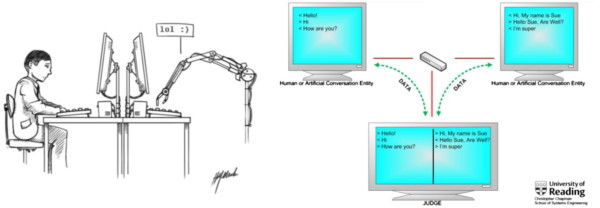 Credit: DOI 10.1080/0952813X.2015.1132273
A new study says it has found a major flaw in the "Turing Test," the leading method to determine artificial intelligence.
Credit: DOI 10.1080/0952813X.2015.1132273
A new study says it has found a major flaw in the "Turing Test," the leading method to determine artificial intelligence. Credit: DOI 10.1080/0952813X.2015.1132273
Credit: DOI 10.1080/0952813X.2015.1132273
A new study says it has found a major flaw in the "Turing Test," the leading method to determine artificial intelligence.
It was designed in 1950 by computer scientist Alan Turing and assesses a machine’s ability to exhibit intelligent behavior indistinguishable from that of a human. It requires a human judge to converse with two hidden entities, a human and a machine, and then determine which is which. Turing introduced his imitation game as a replacement for the question: "Can machines think?" The end conclusion of this is that if an entity passes the test, then we have to regard it as a thinking entity.
It is also called the "Imitation Game" but if it were to actually to mimic a human in one way it could potentially pass the test and be regarded as a thinking entity, argues authors Kevin Warwick and Huma Shah of Coventry University. That way is by "pleading the Fifth" -- invoking the right in the Fifth Amendment of the United States Constitution to remain silent throughout the test. By doing so, any silent entity could pass the Turing Test even if it were clearly incapable of thought. If you force a machine to respond, it skews the outcome.
Warwick and Shah looked at transcripts from actual Turing tests in which the hidden machine remained silent, and in each case the human judge was unable to say for certain whether they were interacting with a person or a machine. A truly smart machine could decide not to reply -- and gaming the test would surely be a sign of artificial intelligence even while it flunked the Turing test -- while a machine experiencing technical problems that prevented it from answering (as was actually the case in the transcripts studied) also has a pretty good shot at being considered human.
“However, if an entity can pass the test by remaining silent, this cannot be seen as an indication it is a thinking entity, otherwise objects such as stones or rocks, which clearly do not think, could pass the test. Therefore, we must conclude that ‘taking the Fifth’ fleshes out a serious flaw in the Turing test.”
###
Citation: Kevin Warwick & Huma Shah, 'Taking the fifth amendment in Turing’s imitation game', Journal of Experimental & Theoretical Artificial Intelligence, DOI: 10.1080/0952813X.2015.1132273


